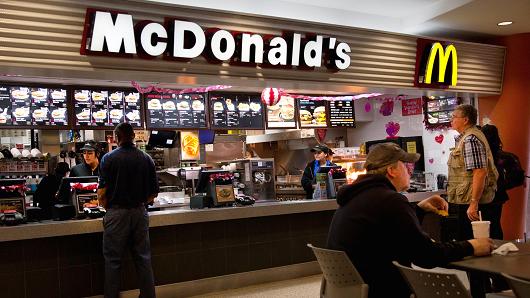Franchising, retail, business

02/04/2015
As McDonald's moves to boost pay for its company-owned U.S. restaurants—about 90,000 workers or roughly 10 percent of its locations nationwide—the question now is whether pressure will mount for the fast food chain's franchises to follow suit. They set their own local wages.
Beginning in July, the company will raise the minimum wage by $1 over the locally mandated minimum pay for its corporate-owned locations. McDonald's estimates the hourly average will be higher than $10 by the end of 2016.
The raise will not affect its more than 3,100 McDonald's franchisees nationwide that operate individual businesses and make their own decisions on pay and benefits.
"This is an initial step for our U.S. business. I understand that some may believe it doesn't go far enough," McDonald's CEO Steve Easterbrook wrote in an op-ed in The Chicago Tribune. "These actions demonstrate meaningful progress, and it is what we can do right now in our company-owned stores."
The McDonald's announcement comes as other big employers have raised starting wages amid a tightening job market. "At McDonald's, we must recruit and retain talented people and motivate them to bring their best to the job every day," Easterbrook wrote. The fast-food giant also announced benefits including paid personal time off.
Other companies to recently raise wages include Target, Wal-Mart, T.J. Maxx and the Gap among others.
Pressure for franchises
The focus now moves to McDonald's franchised operations.
"The franchisees will have to answer to their employees who say, 'What about us?' " said Michael Lotito, co-chair of Littler's Workplace Policy Institute, part of the global employment law practice Littler Mendelson. "This is going to be real interesting."
The International Franchise Association, the industry's largest global trade group, told CNBC that 95 percent of its more than 780,000 franchise establishment members already pay more than the minimum wage to employees who have been with the company more than six months.
The group declined to detail how many of its members are McDonald's franchisees.
"Market forces will dictate higher wages as businesses seek to recruit the best available talent for available jobs," said a franchise association spokeswoman by email.
But for wage advocacy groups, including the National Employment Law Project, the hike is a small gesture.
"McDonald's action falls far short of what is needed to make sure fast food jobs provide a decent living for the men and women who work in them," Christine Owen, executive director of NELP, said in a statement. "It leaves out hundreds of thousands of McDonald's workers at franchises."
Meanwhile the fight for higher wages will continue, advocates say. The fast food strikes organized by the Service Employees International Union will resume on April 15 in more than 200 cities, the "Fight for $15" group says, with protests in select cities Wednesday in response to McDonald's move.
Franchise model under scrutiny
McDonald's wage announcement comes as its in the middle of litigation before the National Labor Relations Board.
McDonald's and labor unions are squaring off over accusations of wage violations and unfair working conditions. The outcome of the case could alter the franchise industry and what corporations are responsible for at individual chain locations.
The labor board is weighing whether McDonald's is defined as a joint employer with its individual franchisees. A ruling that McDonald's is a joint employer would mean the corporation could be held responsible for working conditions, pay and worker's rights violations at individual franchised locations.
Such a ruling would be the first such decision against a major franchisor. And for individual franchisees, a ruling in favor of joint employer status would mean they are no longer independent business owners and more beholden to corporate rules. Trade groups say such a ruling would upend the franchise business model.